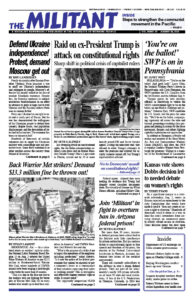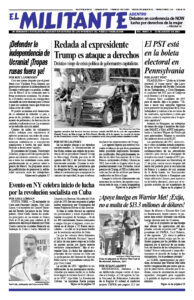SYDNEY — In a major step forward the Communist Leagues in New Zealand and Australia have decided to combine their forces to build one Communist League, based in Australia with its headquarters in Sydney. The decision will enable the party to respond boldly to key developments in politics and working-class struggles not only in Australia and New Zealand but throughout the Pacific region.
The move will build on decades of work, working-class struggle experience, and close collaboration between the two Communist Leagues in Australia and New Zealand, a proud history strengthened by their collaboration with Communist Leagues in Canada and the United Kingdom and the Socialist Workers Party in the United States.
Two longtime Communist League leaders, Linda Harris in Australia and Mike Tucker in New Zealand, presented the decision at a Militant Labour Forum here July 23.
The event — which included not only CL members and supporters but a number of workmates — celebrated the opening of a new hall for the Communist League in the heart of working-class districts in southwestern Sydney. A meal and lively discussion set the tone for all. A similar meeting to celebrate the move will be held shortly in Auckland.
Chairing the meeting, Harris, organizer of the Communist League in Australia, said, “Combining our forces will enable us to reach out from here to campaign with our communist program and win a response among working people more broadly in Australia and the Pacific. It will strengthen our ability to engage in politics and class-struggle developments and to recruit fighters to our party.”
“Economic competition and conflicting capitalist interests are sharpening national tensions and class struggle in the Indo-Pacific region today,” explained Tucker, organizer of the Communist League in New Zealand. “Given Australia’s weight as an imperialist power right at the center of these shifts we decided that’s where we should regroup.”
Imperialist powers in the region, from Washington to London, Paris to Tokyo, are beefing up their military presence and forging new alliances in response to the rise of Beijing as the main economic, political and military rival to Washington in the Asia-Pacific region and beyond. At the same time, all the major capitalist rivals are competing with each other for markets and influence.
“Our world, marked by violent contradictions, is in a deepening crisis of capitalist production and trade,” said Dave Prince, a member of the National Committee of the Socialist Workers Party in the United States. “That crisis is increasingly felt in Australia and throughout the region.” The historical decline of U.S. imperialism — for which there is no replacement — “will lead to a devastating world war unless capitalist rule is replaced by the working and exploited classes around the world.”
This regroupment of longtime fighters in the working class and social struggles in New Zealand and Australia is “a bold move,” he said. It’s in harmony with the long history of large numbers of working people in the two countries moving back and forth as economic conditions and the class struggle allowed. It qualitatively strengthens the prospects for building the communist vanguard in the region. “We’re looking for new fighters who want to take this on,” Prince added.
“The mass rebellion that has been taking place in Sri Lanka shows how the class struggle can explode,” said Tucker. “What is key to advancing such battles is the forging of a party, as the class struggle unfolds, that is guided by a communist program that draws on the lessons of 150 years of working-class struggles.”
“Today New Zealand’s rulers are hesitant to take steps that might jeopardize their long-standing trade relationship with China,” Tucker said. “Hence, successive New Zealand governments have proclaimed they are pursuing an ‘independent’ foreign policy. That’s a complete fantasy. New Zealand’s military remains totally dependent on Australia and the U.S.
“The forces that came together to form the Communist Leagues in Australia and New Zealand in the 1980s have sought to collaborate to build parties in the two countries over many decades,” Tucker said.
Steve Penner, organizer of the Communist League in Canada, told the meeting that there is no political organization in the world, outside of the communist movement, “better able to explain what is driving Moscow’s war on Ukraine, how it has opened a new stage in the breaking apart of the imperialist ‘world order.’ No one else explains the stakes for working people internationally.
“The future that imperialism has in store for us is fascism and war driven by the very workings of capitalism itself. This can only be stopped by mass revolutionary struggles of the working class that culminate in taking power out of the hand of the capitalist rulers. The decision to consolidate our forces in the Pacific,” he said, “is an important step in building the kind of proletarian party rooted in the continuity of the international communist movement that is necessary to lead that fight.”
The decision will allow the Communist Leagues to build a party in Australia able to join in the discussions and struggles of working people on the biggest questions of national and world politics. Campaigning in the New South Wales state elections to be held next March 25, and pointing an independent working-class road forward will be one of the fruits of the merger.


